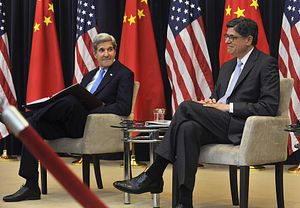Ahead of the U.S.-China Strategic Dialogue, a long-standing issue has reappeared: the question of China’s currency manipulation. The idea that China keeps the value of its currency artificially low has been a sticking point in U.S.-China relations for decades. American business leaders and politicians complain that China’s currency is undervalued, making Chinese exports far cheaper than their foreign counterparts. In a way, the value of China’s currency has become a stand-in for many other economic issues tied up with competition over the manufacturing industry and the increased employment it can provide.
Thus the issue of currency manipulation is given special emphasis during the U.S. election season, when candidates often promise to “get tough” on China to win back American jobs. In 2012, for example, Republican presidential nominee Mitt Romney famously promised to officially declare China a currency manipulator “on day one” of his presidency. Obama himself was vocal about the issue during his initial campaign. In June 2007, he wrote an open letter to then-Treasury Secretary Henry Paulson demanding punitive action against China. He blamed the U.S.-China trade deficit “at least partially” on “the [Bush] Administration’s failure to address Chinese currency manipulation.”
Of course, the emphasis on currency manipulation overlooks the progress that has been made on the issue. At the urging of the business community, George W. Bush made the issue a priority, resulting in a 2005 agreement wherein China would decouple the renminbi from the dollar and allow for a “controlled float” in the RMB’s value. This muted the issue for a time. However, with the onset of the global financial crisis in 2008, China reversed course and reinstituted tight control over the value of the RMB.
Obama would place a great deal of emphasis on the currency issue during his first term. According to Jeffrey Bader, the former head of Asia affairs for the National Security Council, then-Treasury Secretary Timothy Geithner saw increasing the value of the RMB as the single reform that could most positively impact the U.S. economy. As a result, much of Washington’s energies on the economic front went to pushing China to reform its currency policy. The Obama administration’s efforts paid off in 2010, when China again agreed to decouple the RMB from the dollar. The U.S. Treasury department noted in its 2011 report to Congress that China’s currency appreciated nearly 12 percent in real terms (when adjusted for inflation) from June 2010 to December 2011.
Progress is especially evident when compared to the pre-2005 exchange rate, when China had its tightest controls on the RMB. A 2013 Congressional Research Service report pointed out that China’s real effective exchange rate had appreciated over 33 percent between 2005 and 2013. The same report noted that the issue of currency manipulation “appears to have lost some its urgency,” both due to positive progress and to the emergence of other economic disputes (including the use of cyber-espionage to steal intellectual property).
Thus, the issue of Chinese currency manipulation slowly lost importance as the Chinese government signaled that it would relax control over the finance sector. But it’s back in the spotlight now — U.S. Treasury Secretary Jack Lew told the U.S.-China Business Council that he expects the value of the RMB to be one of the top issues at the S&ED this week. While acknowledging progress on the issue, he said that China’s currency is still undervalued. Lew even described the currency issue as fundamental to the trust between the U.S. and China, according to Voice of America.
China was not pleased at the reappearance of an old thorn in the side of U.S.-China relations. A commentary in Xinhua blasted Lew for “fact-twisting and politically misleading remarks” about the value of the RMB. The article outlined the steps China has taken to loosen control for the RMB in accordance with its own economic reforms. In light of China’s progress, the commentary said, the U.S. “fixation on the value of the renminbi has grown tiresome and outdated both technically and politically.”
It is interesting that Lew would single out currency manipulation as one of his top issues for the S&ED. Though the issue has a long history, it has largely dropped out of the spotlight since 2011. Unlike other perennial sources of controversy between China and the U.S. (including IP protection and market access), there has been real, measurable progress made on the currency issue. With a host of new issues also on the docket, most notably U.S. accusations of Chinese cyber-espionage for economic gain, it’s puzzling that Lew would single out the question of China’s currency for special emphasis, particularly as Beijing has already made it clear that its ultimate goal is to allow for more marketization of the finance sector.

































